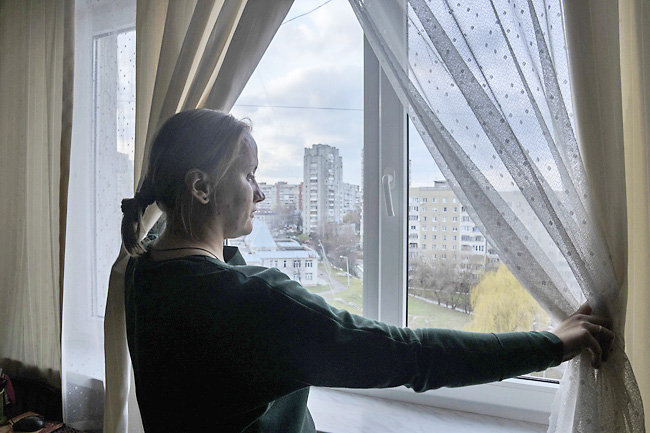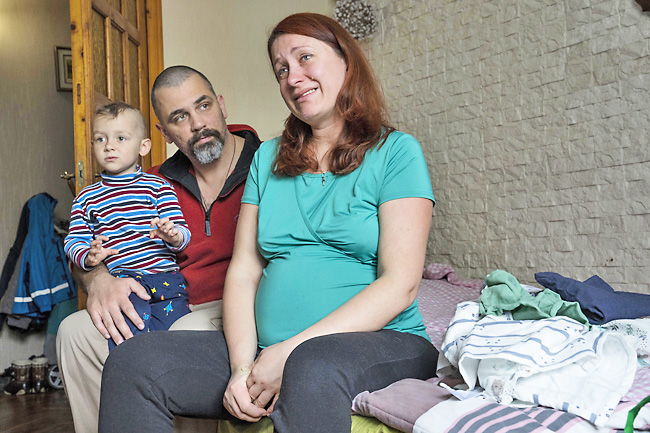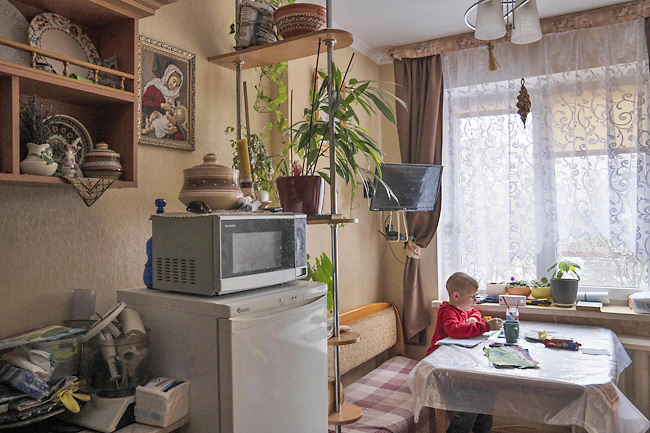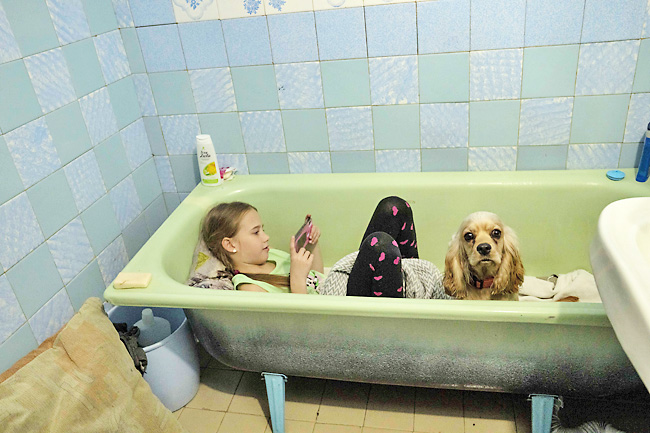LVIV, UKRAINE (AP) – The Soviet-era apartment blocks at the end of a tram line in this western Ukrainian city show an indifferent face to the world, blank and grey. But behind every lighted window is a story.
There is the couple who lament that they may never live in the house being built for them in bloody Bucha. There is the family that spent hours in their basement shelter in Irpin, trapped between armies.
There is the woman who fled Kharkiv, becoming displaced for the second time in a decade.
They all escaped to Lviv, along with some 500,000 others – a small fraction of the 10 million Ukrainians who have been chased by war from their homes and resettled elsewhere in the country.
Many sleep on mats in cultural centres and schools, shelter in crowded rooms with relatives and friends. Some plan to move on, perhaps crossing the border to nearby Poland and beyond. Others have put down the first fragile roots. The rest have little idea what to do.
Most just want to go home, if home still stands.
As many as 50 have found shelter in a nine-storey building on Trylovskoho Boulevard. It is quiet; they can look through their windows and see a school, a playground, not a tank or rocket fire. It’s a world away from the danger that sent them running from their homes, though in recent days, Lviv too has been a target of Russian missiles.






The families live footsteps apart. They don’t know each other, but they recognise displaced people like themselves on sight, without exchanging a word. Take the small, clanking elevator, walk down the dim corridors and visit with them in their temporary apartments, and you’ll find limbo.
“It’s not my flat. It’s not my life,” Marta Kopan said. “But now I’m here.”
Marta is 40 weeks pregnant; the baby, a girl, kicks her vigorously as she goes through bags of children’s clothing in the fourth-floor apartment the family borrowed from a cousin. Her birth plan, like so much else, has been abandoned – the place where she had expected to give birth was bombed.
“On February 24, our happy life stopped,” said Marta, 36. She remembered looking out the window of the family’s Kyiv apartment and watching the lines of cars headed for safety.
Within days, the Kopans – Marta, her husband and two sons – joined them.
Now, some 300 miles away, she sometimes feels nothing. Sometimes it is all too much.
“I don’t need to read the news,” she said, and starts to weep. “I just get the news from my friends.” They told her of homes destroyed and bodies found in pieces. One friend now works to deliver babies in an underground shelter. He sent her photos of nearly 200 pregnant women waiting to give birth.
Marta knows that could have been her.
Kyiv is not all the family left behind. A new home, designed by Marta’s mother, had been waiting for the family in Bucha, just outside the capital. There are woods nearby, with trails for hiking and chances for mushroom and berry picking.
Now the Russian occupiers have pulled back, leaving some of the war’s worst horrors in their wake, and the family doesn’t know if their dream home was left intact. They want to stay in Ukraine, but they have no long-term plan. Marta and her husband are doctors and want to stay and help. For now, they live day to day. The elder son, six-year-old Nazar, continues his schooling online.
Though he knows better, sometimes he asks to return home to Kyiv. “I want my normal life,” he said.
Marta does, too. “I want to have my children to have their own rooms with their Legos, with their different pencils,” she said.
The boy curls up and kisses his mother’s belly, a comfort for her and a greeting for his sister. “I hope he’ll like her when she’ll be crying,” Marta said.
Hours later, just after sunset, the air raid siren wails. The family, like many others here, doesn’t go to the shelter. Marta sits in a puffy coat on the swings, alone in the dusk, while Nazar plays.
Iryna Sanina, 33, speaks in a stairwell on a concrete landing between floors. She leans on her husband, Volodymyr, and wears the only sweater she took with her when they fled Irpin.
She has fuzzy slippers and her ankles are bare, even when she steps outside in the freezing weather.
Her eyes filled with tears as she told her story. She and her husband were trapped for days between Ukrainian and Russian forces, quickly learning to distinguish between incoming and outgoing fire. The bridge to safety was destroyed by the Ukrainian side to slow the Russian advance. Even though her husband insisted that she leave, she wanted to stay.
They hid in a basement shelter in the yard. Whenever the shelling eased, they climbed out to shout to their neighbours, checking to see whether they were alive.
Volodymyr stayed in Irpin longer than she did, helping with evacuations, but it was a struggle; tyres were quickly shredded by shrapnel on the ground. With communications out, Iryna could reach him only by text message. “I could see he received the messages, but he couldn’t answer,” she said. “I didn’t know for days about his fate, and it was terrifying.”
Eventually, elderly neighbours persuaded him to leave for the sake of his 14-year-old son. The boy now shelters three hours away from Lviv with his grandmother, in a safer place with no air raid sirens at all.
Iryna and Volodymyr share their sixth-floor apartment with four other adults from Irpin, all of them colleagues at the drug company where the couple works. It’s very difficult to live with others, Iryna said, but “we know a lot of people lost everything”.
The couple don’t want to let others know they come from Irpin. They don’t want to look like victims. They want to go home, no matter how devastated it is, and rebuild.
More than anything, said Iryna, “I want to go back and wake up on February 24”, before it all began. She is in tears again.



